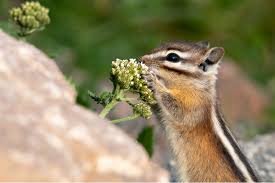Is your garden being invaded by pesky chipmunks? Check out these clever, humane hacks for keeping chipmunks out using simple scent and visual deterrents or exclusion methods.
If you’re an avid gardener, chances are you’ve dealt with those pesky little striped visitors – chipmunks! These energetic little rodents may look cute and harmless, but they can wreak havoc on your garden beds, containers, and even lawns in their constant search for food and nesting materials. From digging up seed beds and bulbs to nibbling on your veggie crops and flowers, chipmunks can really put a dent in your gardening efforts.
Fortunately, there are plenty of humane, simple and effective deterrents you can employ to keep chipmunks out of your precious garden spaces without resorting to harsh chemical repellents or having to trap and relocate them. Let’s take a look at some clever hacks to humanely discourage these persistent garden pests!
Smell Deterrents

Like many rodents, chipmunks rely heavily on their keen sense of smell to navigate and avoid predators. We can use this to our advantage by utilizing strong scents and smells that chipmunks find unappealing to drive them away from our gardens.
One of the most effective deterrent smells is cayenne pepper. Simply sprinkle a dusting of cayenne powder around the perimeter of your garden beds or along any routes chipmunks use to invade. You can even mix it into a spray bottle of water for broader application. The intense spicy scent confuses a chipmunk’s scent receptors and makes them want to avoid the area. Reapply after heavy rains or every few weeks.
Garlic, onions and black pepper are other strong repellent smells that work well for deterring chipmunks. Try burying a few pieces of garlic or whole onions around your garden, or sprinkle black pepper flakes along chipmunk trails. You can combine them with the cayenne pepper for extra potency.
Soak cotton balls in peppermint or eucalyptus oil and place them around your garden and near any entry points or burrows you’ve spotted. Those intense menthol smells are noxious to chipmunks. Replace the cotton balls every few weeks as the scent dissipates.
Visual Deterrents

When it comes to chipmunks, sometimes simple visual scare tactics can be highly effective at driving them away from your garden. Chipmunks have relatively poor eyesight, so anything that moves unexpectedly or casts flickering shadows may spook them into believing a predator is nearby.
An easy visual deterrent is to create a scare balloon by inflating an old mylar balloon and hanging it from a garden stake to wave in the breeze with the sunlight catching it. You can also use old CDs or DVDs strung together to spin and reflect light at chipmunks as they approach.
Rubber snakes or fake owls placed around your garden create the illusion of predators lurking nearby, which should deter chipmunks from wanting to stick around for long. Move these decoys frequently so their locations remain unpredictable.
Aluminum foil and mylar ribbon can also act as visual deterrents that scare chipmunks with reflected light and constant movement in the wind or breeze. Try creating a makeshift fence of reflective foil or ribbon around your garden’s perimeter.
Exclusion Methods

Ultimately, the most effective way to keep chipmunks at bay is to physically exclude them from your precious plants. While it requires some effort upfront, installing proper fencing and barriers will save you tons of frustration and damage in the long run.
Start by assessing all the potential entry points chipmunks may be using to access your garden – look for burrows under raised beds, gaps between paving stones or fences, and nesting areas near your home’s foundation. Seal any openings wider than 1/2 inch using steel mesh hardware cloth lined with gravel. You may also need to trench your garden beds and bury the mesh 1-2 feet underground to prevent undermining.
For raised beds, gardens or containers, you can create a simple cage of chicken wire bent into a frame and secured over the top with zipties or garden staples to allow access while excluding chipmunks. Some people also use bird netting draped over crops and containers.
Avoid using plastic mesh or chicken wire with square holes larger than 1/2 inch, as chipmunks can easily squeeze through these openings no matter how narrow they appear.
With a few budget-friendly materials and some creative application, you can humanely outsmart even the most persistent chipmunk invaders in your garden spaces! These natural deterrents work by triggering a chipmunk’s fear instincts using scent or visual cues that trick them into believing predators or other threats are nearby. By making your garden seem inhospitable, chipmunks will quickly seek an easier source of food and shelter elsewhere – hopefully leaving your precious plants untouched!
Pingback: Outsmarting Garden Pests: Clever Hacks to Keep ...
Pingback: Palmetto Bug Or Cockroach: Differences & How to Kill Them -
Pingback: What Is Mushroom Compost and Why Use It -
Pingback: 10 Tiny Black Bugs That Look Like Poppy Seeds and How to Get Rid of Them
Pingback: Foxtail Fern: A Complete Guide to Growing and Caring
Pingback: Blue Orchids : Real and Fake – All Your Questions Answered - Gardener's School
Pingback: 29 Black Flowers Name & Specifications - Gardener's School